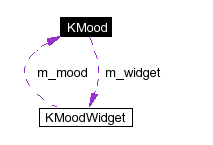
#include <KMood.hh>
Collaboration diagram for KMood:

Public Types | |
| enum | Mood { VeryHappy = 1000, Happy, Cool, Sad, Angry } |
Signals | |
| void | moodChanged (KMood *kmood) |
| void | ageChanged (KMood *kmood) |
Public Methods | |
| KMood () | |
| KMood (QString userName) | |
| KMood (QString userName, Mood mood) | |
| KMood (QString userName, QString moodString) | |
| ~KMood () | |
| void | setView (KMoodWidget *widget) |
| KMoodWidget * | getView () |
| void | setMood (Mood mood) |
| Mood | getMood () |
| void | setAge (int ageMinutes) |
| int | getAge () |
| QString | getMoodString () |
| QString | getMoodForMessages () |
| void | setCurrentUserName () |
| QString | getCurrentUserName () |
Static Public Methods | |
| QString | moodToString (Mood mood) |
| Mood | stringToMood (QString string) |
Static Protected Methods | |
| void | Init (KMood *kmood) |
Private Attributes | |
| Mood | m_mood |
| int | m_ageMinutes |
| QString | m_userName |
| KMoodWidget * | m_widget |
The mood of a person. This is the model of the mood and is shown with the help of a KMoodWidget. Different possible strategies are thinkable to store the users mood and to propagate it to other users.
|
|
The possible moods a person can have. At the moment restricted to five basic moods. |
|
|
|
|
|
|
|
||||||||||||
|
|
|
||||||||||||
|
|
|
|
|
|
|
The signal emmitted if the age of a user changed. |
|
|
|
|
|
|
|
|
|
|
|
|
|
|
|
|
|
|
|
|
Static initializer of objects of this class. |
|
|
The signal emmitted if the mood of a user changes. |
|
|
|
|
|
|
|
|
Get an informative name from the currently logged in user. This can be either additional information from /etc/passwd (the field after the group id) or the login name if other information is not available.
|
|
|
|
|
|
|
|
|
|
|
|
The age of the last change or confirmation of the mood. This is used to make the fading effect of emoticons work. |
|
|
The mood of a user. One of the KMood::Mood types. Represents the mood of a user. |
|
|
The name of the user. Have a look at the setCurrentUserName function to see how the name of the current user logged in to the system is determined. |
|
|
The back link to the view which has been connected to the model. |
 1.2.18
1.2.18